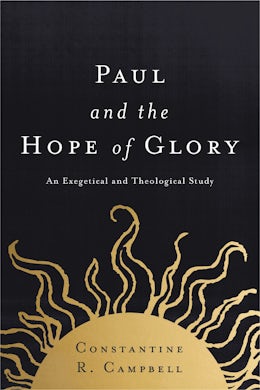Book Summary
In this book, Con Campbell conducts a detailed study of the relevant elements of Paul’s eschatological language, metaphors, and images. He examines each passage in context, aiming to build inductively an overall sense of Paul’s thinking, and demonstrates the integration of Paul’s eschatological thought into his overall theological framework.
About the Book
A Unique Study of Pauline Eschatology that Is Both Exegetical and Theological
One of the trajectories coming out of Constantine Campbell's award-winning book Paul and Union with Christ is the significance of eschatology for the apostle. Along with union with Christ, eschatology is a feature of Paul’s thinking that affects virtually everything else.
While union with Christ is the "webbing" that joins Paul's thought together, eschatology provides the "shape" of his thought, and thus gives shape to his teaching about justification, resurrection, the cross, ethics, and so forth. There is considerable debate, however, about Paul's eschatology, asking whether he is a "covenant" or an "apocalyptic" theologian.
In Paul and the Hope of Glory Campbell conducts a thorough exegetical study of the relevant elements of Paul's eschatological language, metaphors, and images including "parousia," "the last day," "inheritance," "hope," and others. He examines each passage in context, aiming to build inductively an overall sense of Paul's thinking. The results of this exegetical study then feed into a theological study that demonstrates the integration of Paul's eschatological thought into his overall theological framework.
The study is comprised of three parts:
- The first part introduces the key issues--both exegetical and theological--and sets the parameters and methodology of the book. It also offers an historical survey of the scholarly work produced on Paul's eschatology through the twentieth century to the present day.
- The second part contains the detailed exegetical analysis, with chapters on each important Pauline phrase, metaphor, and image related to eschatology.
- The third part turns its attention to theological synthesis. It recapitulates relevant conclusions from the evidence adduced in part two and launches into theological discussion engaging current issues and debates.
This volume combines high-level scholarship and a concern for practical application of a topic currently debated in the academy and the church. More than a monograph, this book is a helpful reference tool for students, scholars, and pastors to consult its treatment of any particular instance of any phrase or metaphor that relates to eschatology in Paul's thinking.
Reviews
'Campbell's study offers a careful exegesis of Paul's writing on eschatology and a fresh set of integrative theological reflections, all developed in dialogue with diverse, modern, scholarly treatments of the apostle's thought. The book will make an important contribution not just to academic activity but to pastoral and homiletical application of Paul's 'hope.''
'Con Campbell has produced a careful and comprehensive study of Pauline eschatology. Campbell works through the key texts and important themes in Paul's letters to explain with a rare mix of insight and clarity what Paul taught about the 'hope of glory.' Campbell handles the complexity and occasional ambiguity of Paul's 'end-times' thought with responsible restraint, even as he offers a lucid explanation of Paul's letters. I have no doubt that this will be the standard book on the subject for decades to come.'
'Con Campbell here proves himself to be the Melanchthon to Vos's Luther, systematically (and exegetically) examining all the relevant texts that touch on what the apostle Paul has to say about the Christian hope of glory. Following Vos, Campbell makes a compelling case that the Pauline eschatology sees all of reality as participating in two realms and two ages, existing side by side and vying for the hearts and minds of every human being, with Jesus Christ himself being the invasion of the new in the midst of the old. In bringing into focus the hope of glory, Campbell has produced the perfect tonic for world-weary pessimists who think that history is a series of one drab thing after another.'
'No one doubts the importance of eschatology for the apostle Paul, which underpins every aspect of his theology and ethics. Yet too often scholars only consider a sliver of his teaching and miss the full range of Paul's terminology and imagery. In Paul and the Hope of Glory, Con Campbell, widely known and admired for his exegetical precision and theological thoroughness, offers the comprehensive study that is so sorely needed.'
'Paul and the Hope of Glory shows the organization of a German monograph, the lucidity of a well-spoken English professor, the nuance of an ancient historian, and the passion of a Protestant evangelical. Where Paul doesn't clarify, Campbell does not clarify; where Paul speaks, Campbell speaks. Some will be surprised, but all will learn. I expect this book to become a steady source for years to come on Paul's eschatology.'
'This enlightening and thorough study is immaculately organized and draws on the entire Pauline corpus. Moreover, rather than trying to fit all the Pauline evidence into a preexisting grid, Campbell develops Pauline theology carefully from his exegesis of the relevant Pauline passages.'
'We are once again in Con Campbell's debt, as he exegetically analyzes and theologically synthesizes the many Pauline eschatological texts, seeing Paul's Christocentric eschatology as the 'frame' of the apostle's theological vision. Campbell's careful consideration of Paul's many eschatological themes and subthemes will no doubt spark occasional debate. But the overall interpretation, recognizing past realities (e.g., Christ's death and resurrection) and present experience (e.g., participation, the Spirit, mission, hope) but especially highlighting future glory, is both enlightening and compelling.'
Product Details
- Imprint: Zondervan Academic
- On Sale: 2020-11-24
- Pages: 528
- Publisher: Zondervan Academic
- Publication Date: 2020-11-24
- Trim Size: 153.000mm x 229.000mm x 39.000mm
- Weight: 557.000gr
- Category 1 : RELIGION / Biblical Studies / Paul's Letters
- Category 2 : RELIGION / Biblical Criticism & Interpretation / New Testament
- Category 3 : RELIGION / Christian Theology / Eschatology

